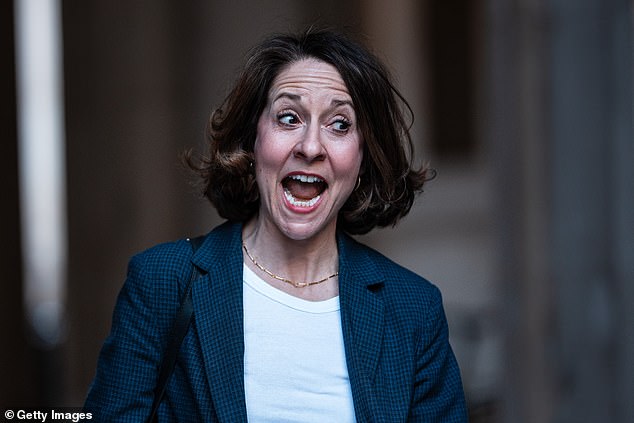Almost two-thirds of households part of the UK are claiming Universal Credit, a new map reveals amid a furious government row over benefit rates.
Work and Pensions Secretary Liz Kendall is expected to unveil fresh curbs on handouts this afternoon despite opposition inside Cabinet and in the wider Labour Party.
The Government wants to axe the growing cost of people going on the sick, which hit £48 billion in 2023-24 and is forecast to continue rising to £67 billion in 2029-30.
Some 64.2 per cent of households in the Perry Bar constituency, in Birmingham, are claiming benefits, more than twice the UK average of 25.2 per cent.
It is the area of the UK with the highest rate of household claims, according to data from the House of Commons Library.
Four out of the five areas with the highest household claimant counts are in Birmingham, with all of the top 10 being found in the Midlands city, London, or Bradford.
In the eight constituencies with the most household claimants, more than half were receiving Universal Credit.
You can use the interactive map below to find out what the rate is where you live.

Work and Pensions Secretary Liz Kendall is expected to unveil fresh curbs on handouts this afternoon despite opposition inside Cabinet and in the wider Labour Party.
One of Sir Keir Starmer’s closest allies said the Cabinet is united behind efforts to slash the welfare bill.
Pat McFadden, the Chancellor of the Duchy of Lancaster and a key figure behind the scenes in the Starmer administration, insisted the plans were ‘entirely in line with the values of the Labour Party’.
Ahead of Work and Pensions Secretary Liz Kendall’s announcement, MPs on Labour’s left and the party’s trade union backers have hit out at the measures, arguing they would punish the disabled and the poor.
Reports have suggested there is also unease around the Cabinet table, with ministers including Deputy Prime Minister Angela Rayner and Energy Secretary Ed Miliband said to have voiced concerns in private.
But Mr McFadden said: ‘I believe the Cabinet is united behind taking on the issue of the growing benefits bill.’
He told Times Radio the current system ‘leaves too many people in a permanent state of dependence on benefits without the opportunity of work’.
Ministers insist that reform is necessary, given the number of people in England and Wales claiming either sickness or disability benefit has soared from 2.8 million to about 4.0 million since 2019.
The Government hopes to save up to £6 billion from the bill as Chancellor Rachel Reeves struggles to balance the books in the face of weak economic growth and mounting debt interest costs.

Reports have suggested there is also unease around the Cabinet table, with ministers including Deputy Prime Minister Angela Rayner (pictured today) and Energy Secretary Ed Miliband said to have voiced concerns in private.
Ms Kendall is set to abolish the ‘work capability assessment’ for universal credit, which is used to determine eligibility for incapacity benefit payments for those with illnesses or disability who have limited ability to find a job.
She is also expected to cut the top rate of universal credit incapacity benefit, which The Times said would be partially offset by an increase to the basic rate and £1 billion pumped into support schemes to help claimants get into work.
The most controversial element of the package could be changes to the personal independence payment (PIP) – a benefit aimed at helping the disabled with the increased cost of living associated with their conditions.
PIP is not means-tested and is available to people even if they are working.
The Government appears to have shifted away from rumoured plans to freeze PIP, meaning a real-terms cut by not increasing the payments in line with inflation, but reports have indicated they will be harder to qualify for in future.
That could include more frequent reassessments for both PIP and incapacity benefits to determine whether the payments are maintained.
Mr McFadden said: ‘Reassessments will be part of the package announced today.
‘We want people, if they’re on long-term sickness benefits, not to languish there forever, but to be reassessed.
‘There have been too few reassessments in recent years.’
But he suggested people with degenerative illnesses or permanent disabilities would be treated differently to those who might have a temporary condition which would allow them to be supported into work.
A series of Labour MPs have already hit out at the plans despite intensive efforts by No 10 to persuade them of the need for change.
Nadia Whittome said she was ‘gravely concerned by the reforms’ reportedly being considered and ‘frankly horrified’ by comments from some ministers, while veteran MP Diane Abbott said there was a ‘chasm’ between ‘a tiny number of people at the top’ and the overwhelming majority of MPs and party members.
Labour Greater Manchester mayor Andy Burnham warned that changes to eligibility and support while leaving the system as it is would ‘trap too many people in poverty’.
Unite’s general secretary Sharon Graham wrote in the Mirror ‘we are putting the poorest against the poorest’, while Unison’s Christina McAnea said: ‘Hitting those least able to speak up for themselves is never acceptable.’







